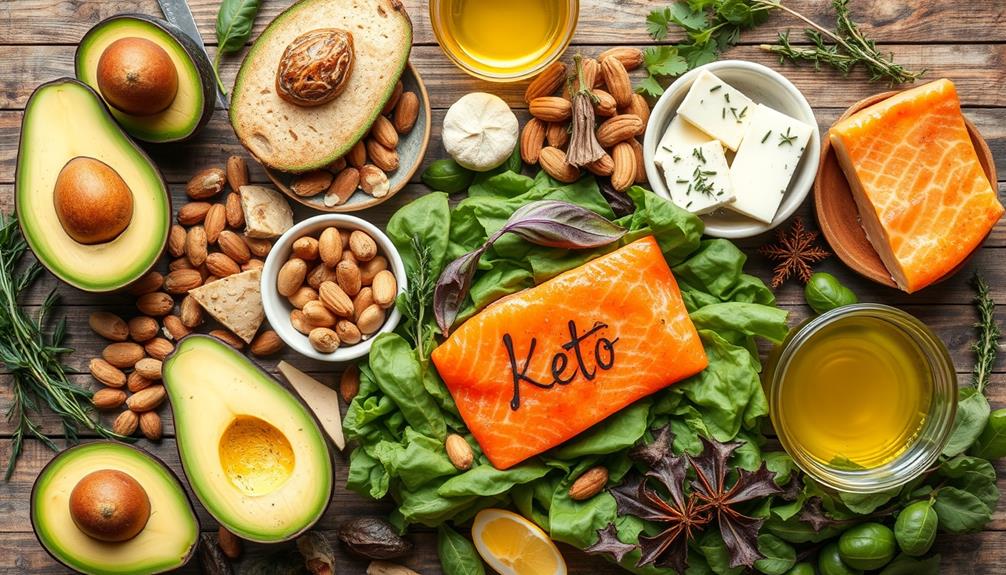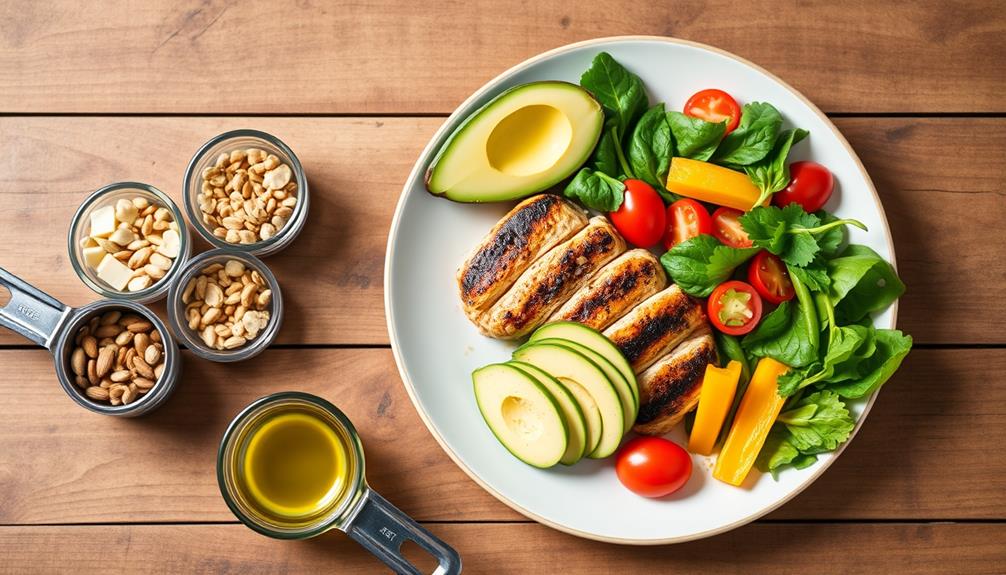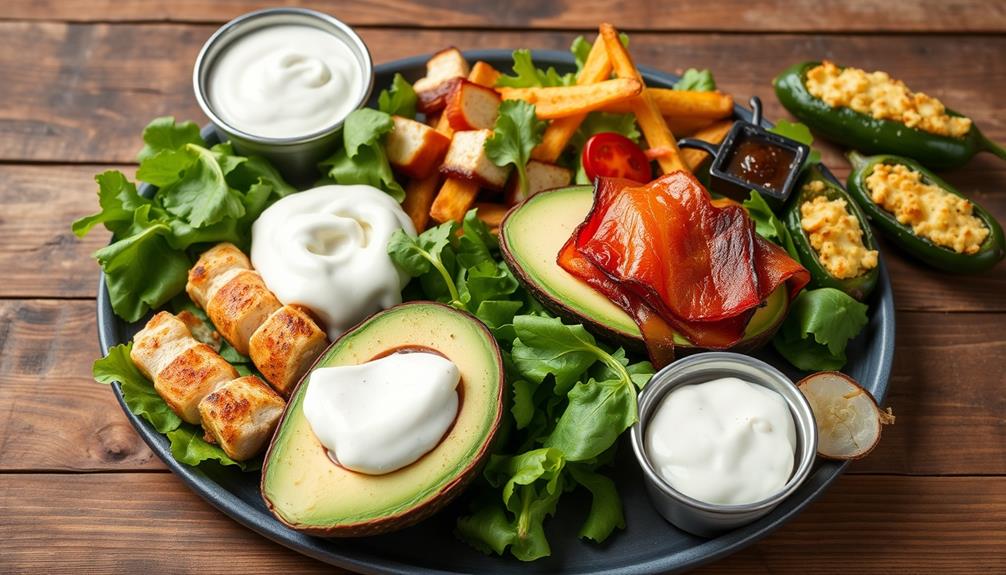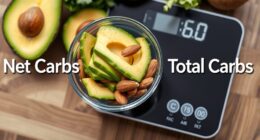To start your keto diet, focus on incorporating fatty fish like salmon, meats, and eggs for protein. Healthy fats are vital too; olive, coconut, and avocado oils add flavor while boosting nutrition. Don't forget low-carb veggies like spinach and cauliflower, which provide essential vitamins. Dairy options such as high-fat cheese and heavy cream can enhance meals without raising carbs. Nuts, seeds, and low-sugar berries are perfect for snacking. By choosing these foods, you'll keep your carb count low and energy high. Keep going, and you'll uncover even more tips and strategies to succeed on your keto journey.
Key Takeaways
- Include fatty fish like salmon and mackerel for high omega-3 content and low carbs.
- Opt for healthy fats such as olive oil and coconut oil to enhance energy and flavor.
- Incorporate low-carb vegetables like spinach and cauliflower to maintain fiber intake and overall health.
- Choose high-fat dairy products like cheddar cheese and heavy cream for protein and calcium with minimal carbs.
- Snack on nuts and seeds like almonds and chia seeds for healthy fats, protein, and low net carbs.
Animal Proteins
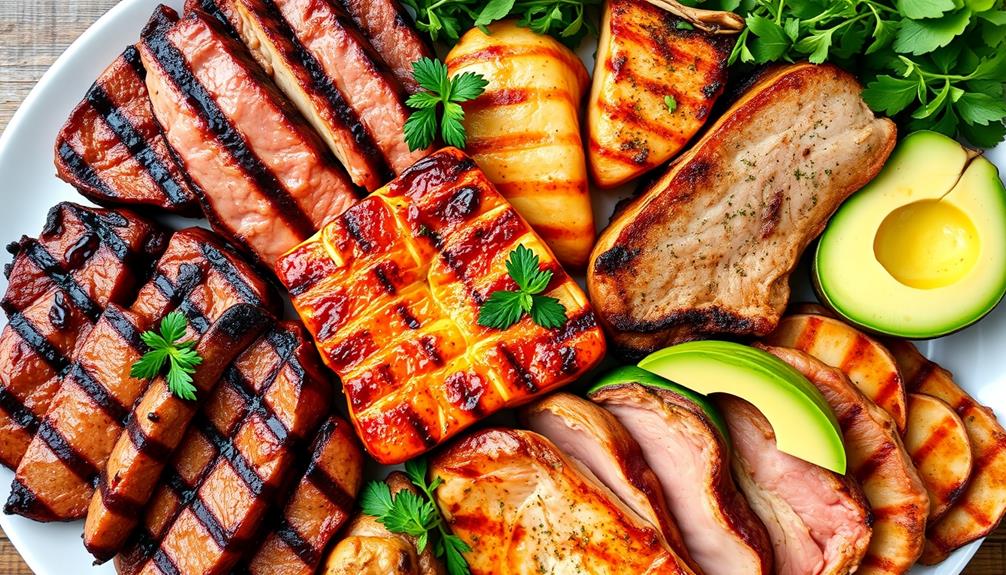
When it comes to the keto diet, animal proteins are essential for maintaining your health and energy levels. These proteins provide high-quality protein while being low in carbohydrates, which helps you preserve muscle mass during low-carb intake.
Fatty fish like salmon and mackerel are particularly beneficial since they're nearly carb-free and loaded with omega-3 fatty acids. These healthy fats support your heart and brain health, making them a must-have in your diet. Additionally, incorporating foods rich in antioxidants, such as certain vegetables, can complement your keto lifestyle certain vegetables and enhance overall well-being.
Fresh varieties of meat and poultry fit seamlessly into the keto lifestyle as they contain no carbs, promoting feelings of fullness and satiety. Incorporating eggs into your meals is also a smart choice; each large egg has less than 1g of carbs and around 6g of protein, making them a versatile and nutrient-dense ingredient for various keto recipes.
For the best nutritional benefits, opt for grass-fed animal proteins. These options have higher omega-3 fatty acid content and conjugated linoleic acid (CLA), both of which may aid in fat loss.
Healthy Fats and Oils
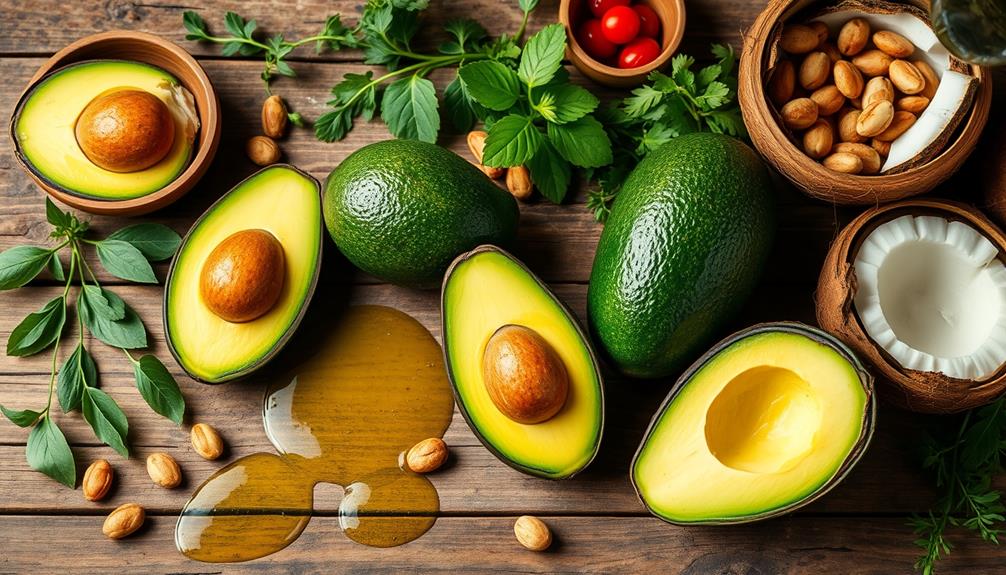
Animal proteins provide a strong foundation for your keto diet, but healthy fats and oils are just as important. They provide energy and support ketosis, helping you stay on track. Here are some top choices for healthy fats:
| Healthy Fat | Benefits |
|---|---|
| Olive Oil | Rich in monounsaturated fats, promotes heart health. |
| Coconut Oil | Contains medium-chain triglycerides (MCTs) for quick energy. |
| Avocado Oil | High in oleic acid, reduces inflammation, and has a high smoke point. |
| Butter & Ghee | Flavorful options with trace carbs; ghee is lactose-free. |
Incorporating these oils into your meals can enhance flavor and health benefits. Olive oil is particularly beneficial for heart health, while coconut oil offers a quick energy boost due to MCTs. Avocado oil not only supports heart health but also stands strong when cooking at high temperatures. Don't forget butter and ghee—they're delicious and versatile, making them excellent additions to your ketogenic diet. By focusing on these healthy fats, you'll fuel your body effectively while enjoying a variety of flavors.
Low-Carb Vegetables
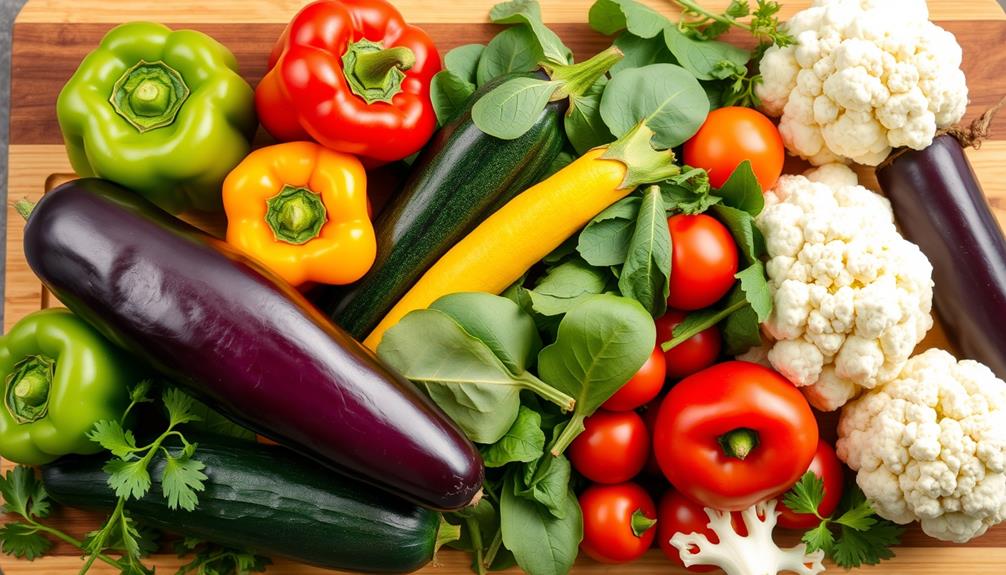
Incorporating low-carb vegetables into your keto diet is essential for maintaining balance and energy. These vegetables provide vital nutrients while keeping your carbohydrate intake low. Spinach, kale, and broccoli are excellent choices, each containing less than 8 grams of net carbs per cup. Additionally, these low-carb vegetables are rich in fiber, vitamins, and antioxidants, which support overall health and digestion on a keto diet. By incorporating the **best vegetables for keto diet**, like cauliflower and zucchini, you can further diversify your meals while still staying within your carb limits. These versatile options allow for creative keto-friendly recipes that keep your meals both nutritious and satisfying.
Leafy greens like spinach and kale are particularly beneficial, as they're low in calories and packed with vitamins A, C, and K, promoting your overall health. Additionally, focusing on the importance of selecting the right cold medication can help when managing symptoms of illness that may arise during your dietary shift.
You can also use non-starchy vegetables, such as cauliflower and zucchini, as substitutes for higher-carb foods. Cauliflower, for instance, is versatile and can replace rice or mashed potatoes in your meals.
Including a variety of low-carb vegetables can help maintain your fiber intake, which is often lacking in keto diets. This boost in fiber supports your digestive health and helps prevent constipation.
Moreover, many low-carb vegetables are rich in antioxidants, offering protective benefits against free radicals. This is significant for reducing the risk of chronic diseases and inflammation.
Dairy Products
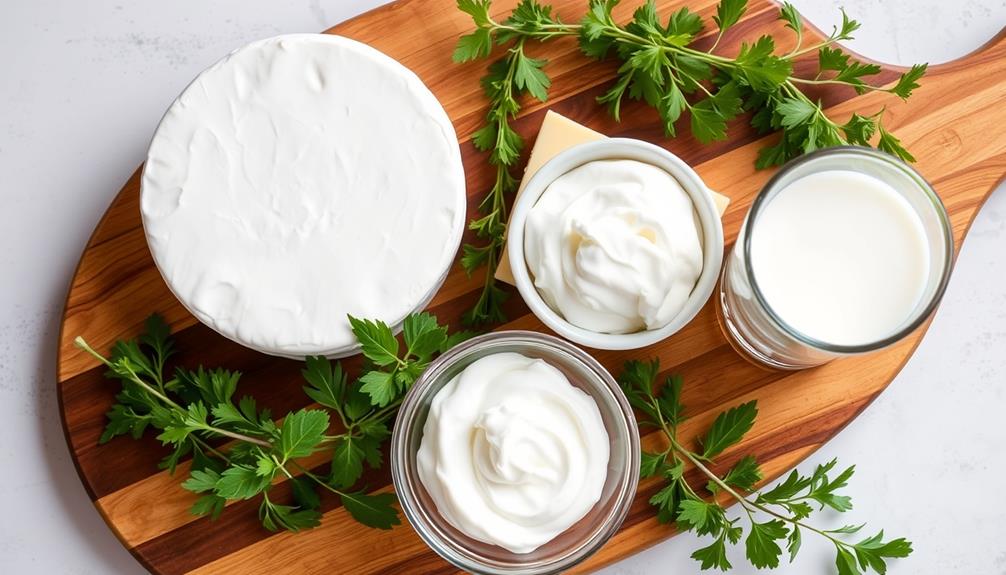
When it comes to the keto diet, dairy products can offer a wealth of nutritional benefits. High-fat cheeses, heavy cream, and even Greek yogurt can all fit into your meal plan while keeping carbs low.
Additionally, incorporating certain essential oils, like peppermint and eucalyptus, may enhance overall well-being during your dietary shift, as they can support respiratory health and improve digestion essential oils for wellness.
Let's explore the best dairy options and some tips to make the most of them.
Nutritional Benefits of Dairy
Have you considered the nutritional benefits of dairy products on a keto diet? Dairy is a fantastic addition, especially when you focus on high-fat options. These foods are low in carbohydrates and can help you maintain your fat intake while providing essential nutrients.
Incorporating dairy can also aid in achieving your savings goals, as it allows for cost-effective meal planning with nutrient-rich foods.
Here are some key benefits of incorporating dairy into your keto meal plan:
- Cheese varieties: Cheddar and other cheeses contain around 1g of carbs per ounce, plus they're rich in calcium, which may support fat loss and heart health.
- Full-fat Greek yogurt and cottage cheese: Both are high in protein—about 20g and over 6g per serving, respectively. They can help you feel fuller longer when consumed in moderation.
- Heavy cream: This low-carb, high-fat option is perfect for adding creaminess to your recipes while keeping you in ketosis.
Additionally, many dairy products provide beneficial probiotics, especially yogurt, which can support gut health.
Recommended Dairy Options
Dairy products offer a delicious way to enhance your keto diet while ensuring you get essential nutrients. When it comes to dairy options, cheese is a top choice. Most cheeses, like cheddar and mozzarella, are low in carbs, with cheddar containing about 1g of carbs per ounce. They're high in fat, making them perfect for keto snacking or meal additions.
Additionally, incorporating essential oils for skin conditions may provide added benefits if you're looking to maintain healthy skin while on the diet.
Full-fat Greek yogurt is another fantastic option. It packs around 20g of protein and just 8g of carbs per 7-ounce serving, giving you a good source of protein while staying relatively low in carbs.
If you enjoy cottage cheese, opt for the full-fat version. It has over 6g of carbs per serving but is still a suitable choice for keto, offering protein and calcium.
Heavy cream is incredibly versatile, with less than 1g of carbs per tablespoon, allowing you to add richness to recipes without sacrificing your diet.
Dairy Consumption Tips
Choosing the right dairy products can make a significant difference in your keto journey. Opt for high-fat options to maintain low carb intake while enjoying the benefits of dairy. Here are some tips to take into account:
- Cheddar cheese: With only 1g of carbs per ounce, it's a tasty addition to your meals.
- Plain Greek yogurt: It packs a punch with 20g of protein per 7 ounces but contains 8g of carbs, so use it sparingly.
- Full-fat cottage cheese: Offering over 6g of carbs per serving, it's a nutritious snack that pairs well with low-carb fruits like berries.
Incorporating these high-fat dairy products not only boosts your calcium intake but also helps control your appetite, making it easier to stick to your keto diet.
Remember to monitor your total carbs, especially with flavored yogurts that may have added sugars. By choosing full-fat options, you can enhance flavor while staying aligned with your keto goals.
Enjoy your dairy wisely, and you'll find it can be a satisfying part of your low-carb lifestyle!
Nuts and Seeds
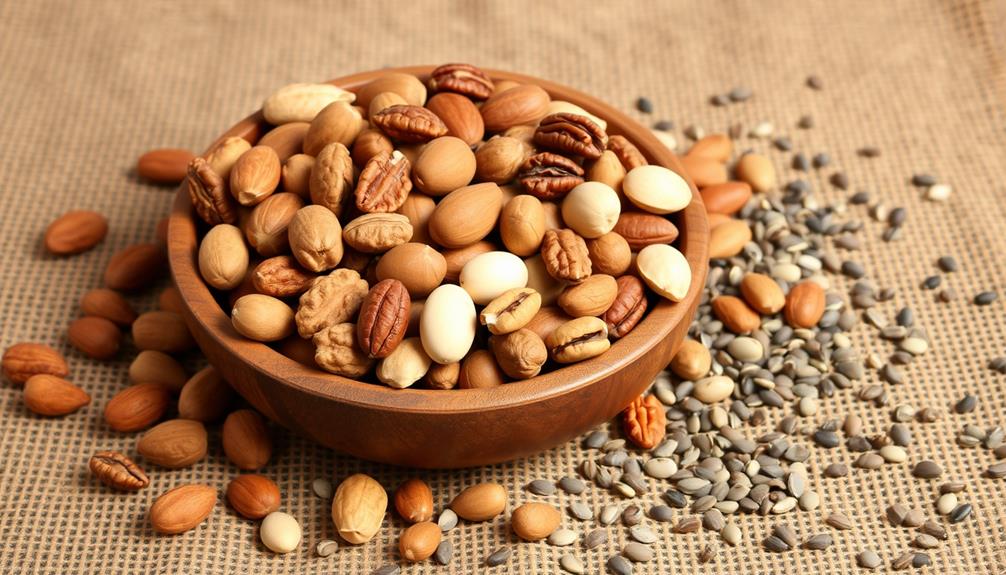
Nuts and seeds are powerhouses of nutrition for anyone following a keto diet. They provide a great source of healthy fats and protein, essential for achieving your dietary goals.
For instance, almonds pack about 14g of fat and 6g of protein per ounce, with only 2.5g of net carbs. Walnuts are another fantastic choice, offering around 18g of fat and 4g of protein while delivering omega-3 fatty acids and just 2g of net carbs.
Chia seeds are also keto-friendly, containing approximately 9g of fat, 5g of protein, and only 1g of net carbs per ounce. Their high fiber content contributes to better digestive health.
If you're looking for a high-fat nut, macadamia nuts are perfect, boasting around 21g of fat and only 1.5g of net carbs per ounce, making them excellent for maintaining ketosis.
However, it's vital to practice portion control since nuts and seeds are calorie-dense. An ounce of mixed nuts can contain about 170 calories, so be mindful of your servings to guarantee you stay within your daily limits while enjoying these nutritious snacks.
Berries
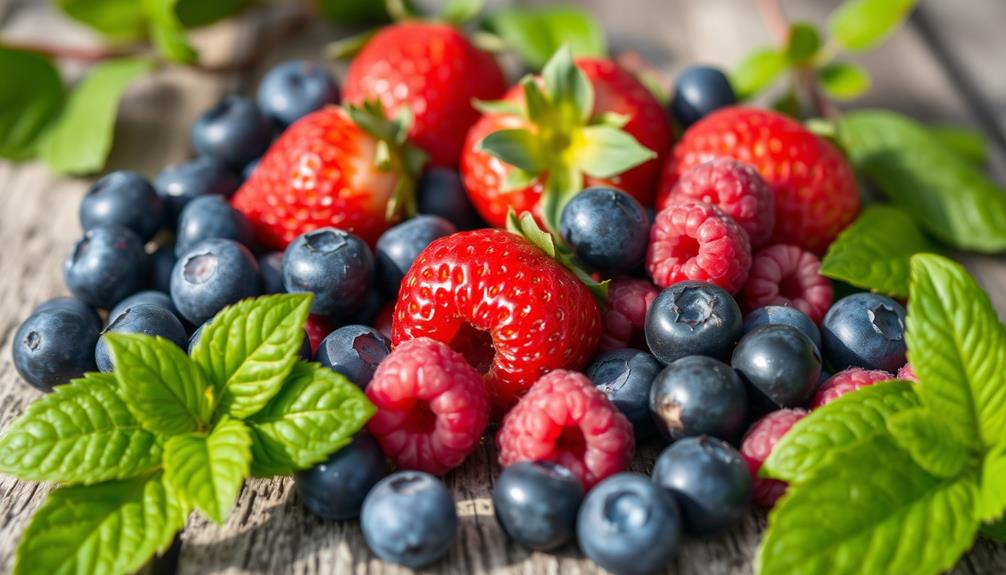
Incorporating fruits into a keto diet can be tricky, but berries stand out as a delicious option. These low-sugar fruits, like strawberries, raspberries, and blackberries, are perfect for satisfying your sweet tooth without derailing your carb count. With net carbs ranging from 3g to 9g per half-cup serving, you can enjoy them guilt-free.
Here are some benefits of adding berries to your keto meal plan:
- Raspberries: With the highest fiber content among berries, they pack about 8g of fiber per cup, which helps offset their carb count.
- Strawberries: Offering around 7g of net carbs per half-cup, they're rich in vitamin C and antioxidants, boosting your immune health.
- Blackberries: Containing approximately 6g of net carbs per half-cup, they're loaded with vitamins K and C, promoting overall wellness.
Berries are versatile and can elevate your keto recipes. Toss them into smoothies, sprinkle them on low-carb yogurt, or add them to salads for a burst of flavor without greatly increasing your carb intake.
Enjoy these vibrant fruits while staying on track with your keto journey!
Frequently Asked Questions
How Do I Start My Keto Diet for the First Time?
To start your keto diet, assess your current eating habits and gradually lower carbs to 20-50 grams daily. Focus on high-fat foods, stay hydrated, and plan meals to guarantee balanced macronutrient intake.
What Is the Best First Meal for Keto?
When you think about the best first meal for keto, consider a breakfast scramble with eggs, spinach, and cheese; it's low in carbs, high in protein, and fuels your day with healthy fats.
What Foods to Eat to Start Ketosis?
To kickstart ketosis, focus on fatty fish, fresh meats, low-carb vegetables, healthy fats, and high-fat dairy. These choices keep your carb intake low while supporting your body's shift into burning fat for fuel.
What Are the Top 10 Keto Foods?
Did you know nearly 80% of people find success on a keto diet with the right foods? Focus on fatty fish, meats, low-carb veggies, high-fat dairy, and healthy fats to stay energized and satisfied.
Conclusion
In commencing your keto journey, focusing on these nutrient-dense foods will set you up for success. By incorporating animal proteins, healthy fats, low-carb veggies, dairy, nuts, and berries, you'll fuel your body while keeping carbs at bay. Think of it as a modern-day alchemy, transforming your diet into one that promotes health and vigor. So, embrace this culinary adventure and watch as your body thrives on this low-carb regimen. Your keto revolution awaits!
